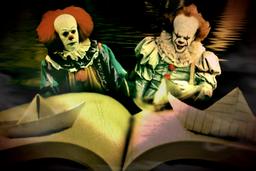The number of Stephen King stories that have made their way to our screens is downright scary: over 50 movies (and counting), along with dozens of shows and miniseries. To become the highest-grossing King adaptation of them all is no small feat, then—one might say there has to be an It factor. Eight years ago, director Andy Muschietti’s big-screen imagining of It didn’t just break records within the Stephen King Cinematic Universe: By grossing over $700 million, It made more money than any horror film in history. Throw Muschietti’s sequel into the equation, and the two-parter was a billion-dollar behemoth.
On the surface, you can understand why It would have such mass appeal. If anything can unite the horror fanatics of the world, it’s an otherworldly clown with razor-sharp teeth luring unsuspecting children to their doom. It also doesn’t hurt that our first encounter with Pennywise (Bill Skarsgard)—in which the sewer drain–lurking monster kills poor Georgie Denbrough—is such effective nightmare fuel that it’d work just as well as a short film, no context required.
This is what Muschietti’s It was great at: devise an encounter with Pennywise (or any of the other forms it would take), ratchet up the tension, and unleash a hair-raising jump scare or two. The formula was, to invoke another billion-dollar Warner Bros. horror franchise, very Conjuring coded. These kinds of movies clean up at the box office for a reason: The scares are fun, palatable, and weightless. But with It, the popcorn pleasures of the films are a very different experience from navigating King’s text.
If you’ve also read It, well, congratulations on making it through a book nearly as long as War and Peace. For the uninitiated, there’s much more to It than a child-eating clown: Across 1,000-plus pages, King explores how the fictional town of Derry, Maine, has been corroded by this primordial evil for centuries. Like a sinister cicada, Pennywise awakens every 27 years to go on a feeding frenzy, precipitating some local tragedy while reflecting the real-world anxieties of the era, from the early days of European settlers to the economic hardships and racial injustices of the 20th century. The inhabitants of Derry, meanwhile, are largely indifferent to the suffering that has plagued the community—whether Pennywise feeds off the town’s complicity or somehow influences it is open to interpretation.
That Muschietti’s It movies are more concerned with being an ’80s coming-of-age story—and for the so-called Losers Club to confront their childhood trauma as adults—worked in their favor, especially at the height of Stranger Things fever. But it also means that, within the It lore, there’s plenty of material that was left on the cutting-room floor. And considering how It absolutely feasted at the box office, you can hardly blame HBO for trying to pick all the meat off the bones of King’s masterwork.
The newest member of HBO’s heralded Sunday night lineup is It: Welcome to Derry, an eight-part prequel series executive-produced by Muschietti. Set in 1962, during the feeding cycle before Pennywise’s rampage in 2017’s It, Welcome to Derry is inspired by interludes in the book that were written from the perspective of Mike Hanlon, the sole member of the Losers Club who remains in Derry and traces Pennywise’s horrific history in the town. (If Welcome to Derry is a hit, future seasons would delve further into the past.) In the series, Mike’s father, Will, is a young boy who’s moved to Derry at the worst possible time: Children are disappearing, and authorities are trying to pin the blame on the Black projectionist at a local theater, the last place many of them were seen. Before long, Will befriends other outcasts at school who believe there’s something monstrous terrorizing the town and sets about getting proof.
For fans of the films, there are familiar pleasures to be found in Welcome to Derry: another version of the Losers Club, another showcase for Pennywise to manifest as someone’s greatest fear. (Highlights include a screaming lampshade made of human skin and a mother who died in childbirth.) But while setting up a bunch of jump scares works well within the context of a movie, it’s less suited to the rhythms of a TV show. You can see the next Pennywise attack sequence coming from a mile away: Take a shot every time a kid wanders on their own, hears something strange, turns around right after the monster is out of sight, or gets scared when they least expect it. (Or don’t, if you plan on driving.) By this point, it’s less creepy than cliché.
More disappointing is that, of the five episodes made available to critics, so little of Welcome to Derry explores elements of the novel that the movies sidestepped. With the exception of one affecting scene in which Will’s mother, Charlotte, witnesses a child being bullied while the rest of the townsfolk brush it off as “boys will be boys,” the series doesn’t meaningfully examine the role that community-wide complicity plays in Pennywise’s reign of terror. Instead, Welcome to Derry attempts to comment on the issues of its time, homing in on tensions related to the Cold War and the Civil Rights Movement. (Obviously, the Black projectionist becoming a town pariah because of the missing children is hardly a coincidence.) But for all the talent involved, including Emmy and Oscar winner Cord Jefferson as a consulting producer, Welcome to Derry never quite tackles these ideas with the incisiveness you’d expect from a show with HBO’s pedigree.
It’s more of a backhanded compliment to point out what Welcome to Derry does excel at: For all the aspirations to explore weightier themes, the series is at its most memorable when it gets unabashedly goofy. As in, there’s a subplot so jaw-droppingly dumb that I actually had to pace around my living room to process everything. To anyone who’s spoiler-averse, don’t read beyond this point.
OK, here it goes: Will’s father, Leroy, is an Air Force major stationed in Derry, home of America’s northernmost military base. But the general in charge isn’t focused on the Soviet Union: He wants to [deep breath] capture Pennywise and use the monster as a weapon. How does the general know about Pennywise? He lived in Derry as a kid and was nearly eaten by it. Somehow, that traumatizing experience made him believe, and I quote, that Pennywise is “how to keep this country safe”(?!?!). This is literally what Vincent D'Onofrio’s character wants to do with velociraptors in Jurassic World, and look how well that turned out for him. The Pennywise military subplot opens up a whole can of worms, such as:
- How many high-ranking military officials are aware of Pennywise’s existence?
- Why haven’t they alerted Derry residents that there’s something endangering their children?
- If Pennywise were a government asset, would it have comm access during missions?
- Could Pennywise have prevented the Cuban missile crisis?
- Are there Pennywise files tucked away somewhere in Area 51?
- Does POTUS have the power to initiate Pennywise Protocol?
- If they can’t capture Pennywise, why not evacuate everyone from Derry and nuke the town from orbit?
- No, but seriously, why does the American government let anyone stay in Derry when they know about a transdimensional, shape-shifting murder clown living in the sewer system?
With this ridiculous turn of events, it’s little wonder that Welcome to Derry excels as high-end schlock more than prestige television. The question is whether the series is actually in on the joke. There’s a seriousness to the endeavor, and at times, Welcome to Derry manages to tap into something profound—that Pennywise torments children who have spent time in a mental hospital, come from broken homes, or have racially diverse backgrounds underlines how the most marginalized members of a community can fall through the cracks. But these ideas, however well-intentioned, are undermined by how much silliness is baked into the show’s DNA, Private Pennywise and all.
At least the clown still has the juice. The best thing Welcome to Derry has going for it is Skarsgard, who appears sparingly to tremendous effect. (Whether that was intentional or the result of Skarsgard being too busy playing other monsters is unclear.) If all you’re looking for is more fodder for the Pennywise scene pack, by all means, give Welcome to Derry a spin. But anyone hoping that the series can mine the richest layers of King’s text—the way trauma festers in silence, or how violence only begets more violence—will come away wanting. Welcome to Derry might be the next series in HBO’s vaunted Sunday night lineup, but all that effort is going down the drain: The real curse plaguing Derry isn’t Pennywise but our inability to leave well enough alone.



